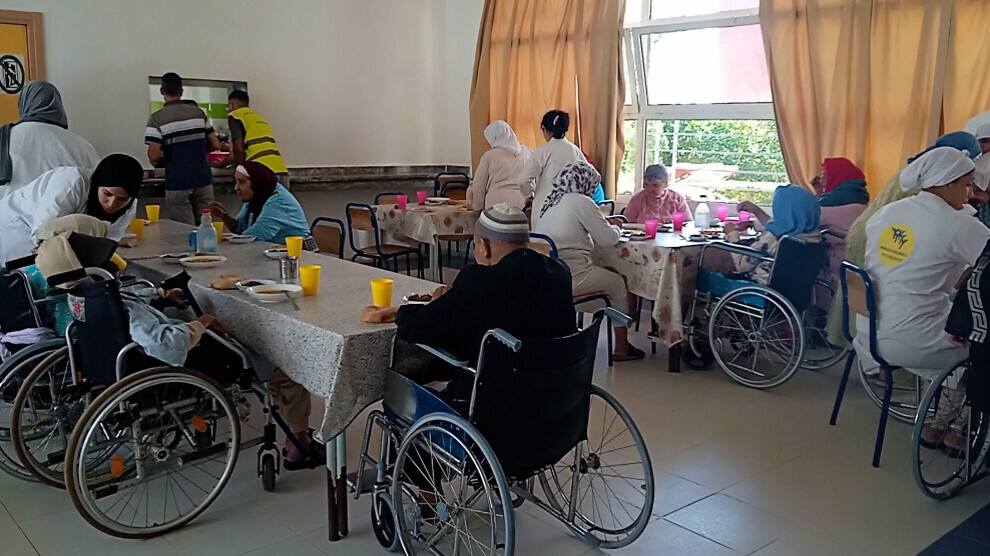Diary of a Woman in the Battle of Care
Between the corridors of the home, the image of a woman is reflected - not merely an administrator, but one who moves from room to room to check on the elderly, smiling at them and trying to make them feel that isolation is not their destiny.

Hanan Hart
Almaghrib- Speaking about how she began her journey in charitable and community work, and in caring for the elderly, Saadia Sniba says:
"I inherited my love for charity from my mother. What first caught my attention was the sight of abandoned elderly people sleeping outdoors in my small hometown. That moment drove me to fight for the creation of this project. I was nicknamed ‘the mother of the elderly,’ even though I am younger than them, because they found in this home the affection, solidarity, and safety they had lost."
She describes this human connection by saying: "The residents here consider me like a mother, and I’ve lived unforgettable stories with them - like a father reuniting with his son after 38 years of separation, or another man who met his family after 34 years but stayed with them only one month before he passed away. Stories like these always make me ask: why do we abandon our parents?".
She notes that most residents suffer from chronic and psychological illnesses, including Alzheimer’s, which makes their care require close follow- up and a healthy environment.
"We provide them with medication and accompany them to hospitals, but financial difficulties never end. Dealing with them requires patience and sensitivity because they are like children in their emotions."
Despite the heavy responsibility she bears, Saadia believes that women in society still face obstacles even when they reach decision- making positions:
"In our societies, certain mindsets remain dominated by patriarchal attitudes. Any woman who has managed to reach such positions is one who has struggled and broken through barriers to pave her own way."
Absent Policies or Superficial Presence?
Official figures reveal the magnitude of the challenge Morocco faces with population aging. The proportion of people over 60 years old rose from 9.4% in 2014 to 13.8% in 2024 - around 5 million people - and is expected to exceed 10 million by 2050, representing about 23% of the total population. According to reports from the High Commission for Planning and the United Nations Population Fund, these numbers highlight the urgent need for effective policies and programs to support the elderly and ensure their rights and well-being.
Despite this demographic shift, public policies directed at senior citizens remain fragmented and underfunded - a reality reflected daily in care centers like the one Saadia manages.
"We receive annual support from some entities, but it covers only half of our needs. Medication costs alone are extremely high, not to mention diapers and hospital transportation. We also face serious administrative challenges, such as the loss of national ID cards, which complicates medical procedures."
She adds that one of the most painful challenges is dealing with elderly residents who have no ID or family members to take responsibility for them.
"When one of our residents passes away, we often face administrative hurdles that delay burial. We have an elderly man and woman who died months ago, and we are still waiting for the paperwork to be completed. It’s heartbreaking."
Aging Societies... A Regional Conversation
The demographic shifts in North Africa extend beyond Morocco to include Algeria, Libya, and Mauritania, where most elderly people face major challenges due to weak social coverage and the lack of specialized healthcare facilities - leaving them dependent mainly on families or private and community initiatives.
According to 2024 data from the United Nations Population Fund, Morocco’s population aged over 60 reached about 5 million in 2024 and is expected to double to around 10.7 million by 2050, or 23% of the total population. Women make up the majority of this group, making them particularly vulnerable due to limited social protection and the fact that many do not receive retirement pensions.
Given this reality, the humanitarian and institutional initiatives led by Saadia Sniba and her team play a crucial role in filling the gaps and providing care for the elderly.
In conclusion, Saadia says:"We cannot reduce the elderly to a single day of celebration. They are fathers, mothers, and the symbol of the family. I call upon government institutions to give greater attention to this group - and upon society to remember that caring for our elders is not merely an act of charity, but a duty we all share."
